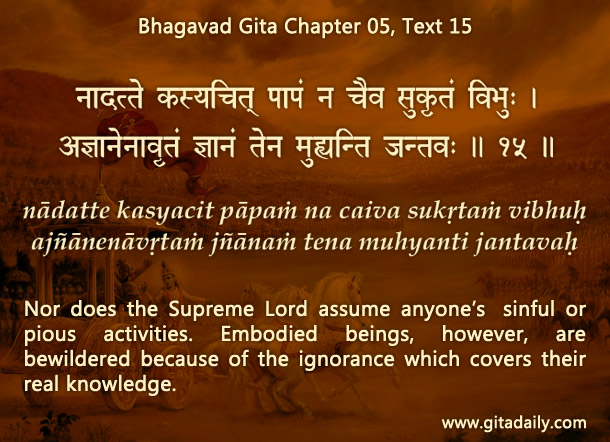On knowing the definition of God as the cause of all causes, we may get the question, “Is he the cause of the wrongs that people do?”
No, because though he is the cause of all causes, he has also given free will to some of those causes, namely, the conscious living beings. When they misuse their free will, they act in evil ways, in defiance of God’s will. Those wrongs are not caused by God.
Consider an example: Rains are the cause of nourishment for all vegetation growing in a field. But rains don’t determine the specific vegetation that grows there – that is determined by the kind of seeds in the field. If good seeds have been sown, good vegetation will grow. Otherwise, simply weeds may grow.
Similarly, God provides all living beings with a field of action, namely, their material body and their material situations. The seeds in this field are their own desires. And according to those desire-seeds, the yield of good or bad deeds arises in that field. Pertinently, the Bhagavad-gita (05.15) states that the Supreme doesn’t determine the actions of the living beings; they themselves sometimes choose wrong actions, being deluded by ignorance.
Such ignorance can be eradicated by Gita wisdom. By this knowledge, we gradually understand that loving service to Krishna is the source of the greatest happiness for us. Understanding this and practicing bhakti-yoga enables us to change the desire-seeds in our heart, thereby bringing auspiciousness in our life.
To summarize, God is the cause of all causes in the sense that he is the source of all the things in this world. And he is not the cause of all effects in that he is not the desirer of all the events that happen here.
To know more about this verse, please click on the image
Explanation of article:
Podcast:


This explanation has made my day. Very good analysis and example.
in the material world, all human beings cursed GOD for the ill effects of their action as in Kerala tragedy.
Hare krishna Prabhu – So beautifully you clarified my doubt. We would always be grateful to you for your sharing this subtle knowledge in a manner understandable to us, Thanks a lot.
Great explanation
Understood, that God gave us a free will, and will is a result of brain capability. I have seen many does not understand right or wrong so well due to their limitations. If God has given free will, why not every human made equal?
Answered here:
http://www.thespiritualscientist.com/2016/04/%e2%80%8bwhy-god-not-give-everyone-equal-capacity-understand-right-wrong/
ys
ccdas
That was indeed great explanation … Truly appreciate the audio…
I will always grateful to you for providing nectarine knowledge with high class finer subtle explanation.